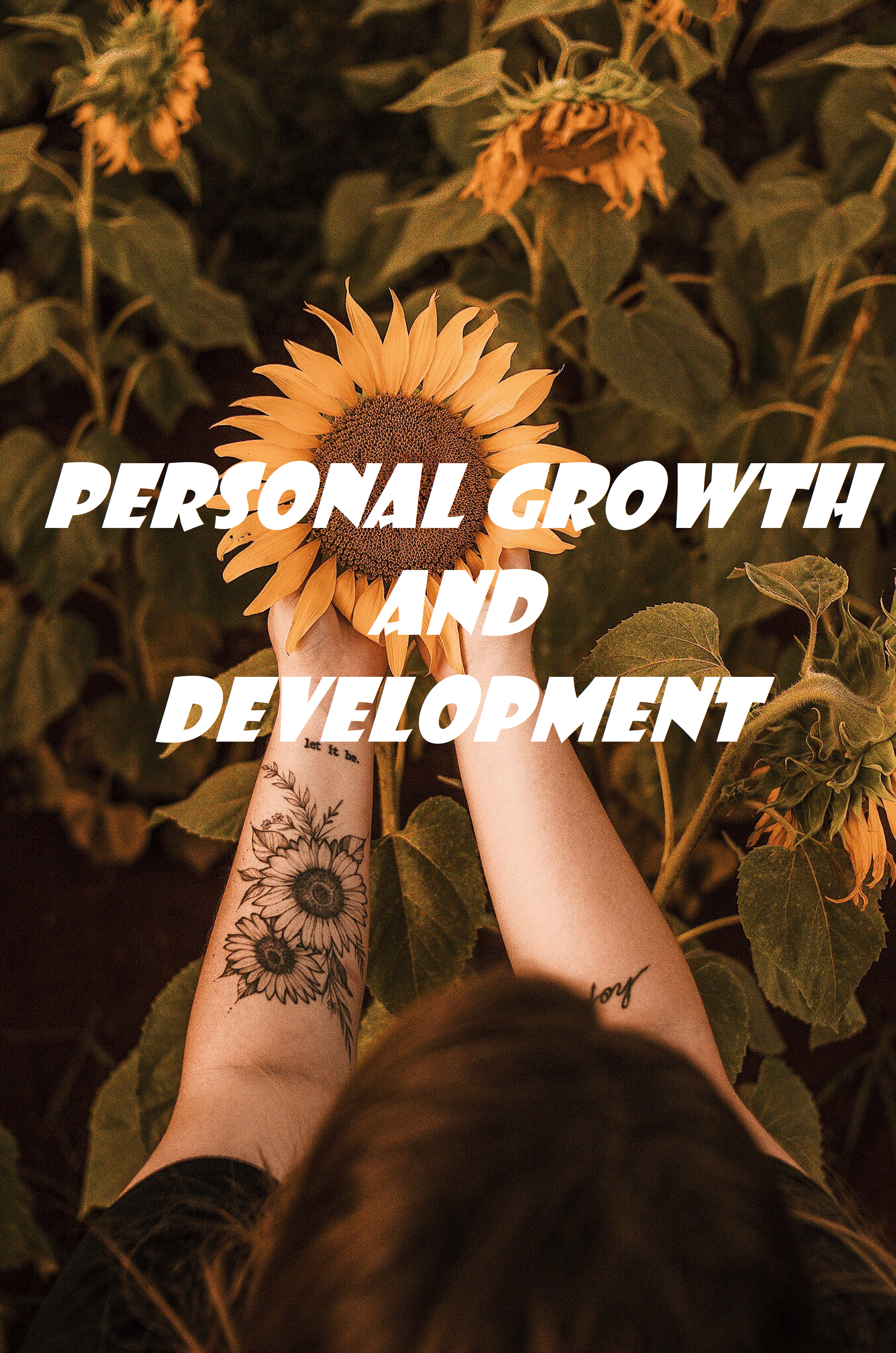Personal growth and development are essential for individuals to reach their full potential and lead fulfilling lives. It involves continuous learning, self-awareness, and improvement in various areas of life. In this article, we will discuss the importance of personal growth and development and ways to achieve it.
***freeDIGIBOOK***Love Your Heart: A Comprehensive Guide to Heart Health
1. Improving Self-Awareness
The first step towards personal growth and development is improving self-awareness. This involves understanding our thoughts, feelings, and behaviors, and how they affect our lives. Self-awareness can help us identify our strengths and weaknesses and work on them to achieve our goals.
Practice mindfulness: Mindfulness involves being present and aware of our thoughts and feelings in the present moment. This can help us become more self-aware and recognize patterns in our behavior or thought processes.
Keep a journal: Writing down your thoughts and feelings in a journal can help you become more self-aware and identify patterns in your behavior or thought processes. It can also help you track your progress towards your goals.
Seek feedback: Seeking feedback from others can help us gain insight into our strengths and weaknesses. This can include asking for feedback from colleagues, friends, or family members.
Reflect on past experiences: Reflecting on past experiences can help us identify patterns in our behavior or thought processes and gain insight into our strengths and weaknesses. This can include reflecting on past successes and failures and identifying areas for improvement.
Take personality tests: Taking personality tests such as Myers-Briggs or the Enneagram can help us gain insight into our personality traits and how they affect our behavior and relationships.
Practice self-reflection: Taking time to reflect on our thoughts and feelings can help us become more self-aware and identify areas for improvement. This can include taking a few minutes each day to reflect on our day or setting aside time for regular self-reflection sessions.
2. Developing New Skills
Developing new skills is an essential part of personal growth and development. It can help us become more adaptable, open-minded, and confident. Learning new skills can also lead to new opportunities and experiences.
Ways to develop new skills include:
Taking classes or courses: Signing up for classes or courses in areas of interest can provide structured learning and skill development.
Reading and research: Reading books or articles in areas of interest can provide knowledge and insights into new skills.
Practice: Practicing new skills regularly can help us improve and develop expertise.
Take online courses: There are many online courses available in various subjects, such as programming, marketing, or design. Taking online courses can help you develop new skills and improve your knowledge in a specific area.
Attend workshops or conferences: Attending workshops or conferences can provide hands-on learning and opportunities to network with other professionals. This can help you learn new skills and gain insights into the latest trends in your industry.
Join a club or organization: Joining a club or organization that aligns with your interests can help you develop new skills and connect with like-minded individuals. This can include joining a writing group, a photography club, or a hiking club.
Read books or blogs: Reading books or blogs in areas of interest can provide knowledge and insights into new skills. This can include reading books on personal development, business, or self-improvement.
Take on new projects: Taking on new projects at work or in your personal life can provide opportunities to learn new skills and gain experience. This can include taking on a leadership role in a project or learning a new software program.
Learn a new hobby: Learning a new hobby can help you develop new skills and provide a creative outlet. This can include learning how to paint, play an instrument, or cook new dishes.
3. Setting Goals
Setting goals is a crucial part of personal growth and development. Goals provide direction and motivation and help us focus our efforts towards achieving our desired outcomes.
Ways to set goals include:
SMART goals: Setting goals that are Specific, Measurable, Attainable, Relevant, and Time-bound can help us stay focused and motivated.
Long-term and short-term goals: Setting both long-term and short-term goals can help us break down larger goals into achievable steps.
Tracking progress: Tracking progress towards our goals can help us stay on track and make necessary adjustments to achieve our desired outcomes.
4. Cultivating Positive Habits
Cultivating positive habits is a vital part of personal growth and development. Positive habits can help us become more productive, efficient, and focused.
Ways to cultivate positive habits include:
Wake up early: Waking up early can provide more time in the day to focus on personal goals, exercise, or other productive activities.
Create a morning routine: Establishing a morning routine can help create structure and set the tone for the day. This can include activities such as meditation, exercise, or journaling.
Practice goal-setting: Setting and working towards achievable goals can provide a sense of purpose and direction. This can involve setting both short-term and long-term goals.
Prioritize self-care: Taking care of oneself is important for personal growth and development. This can include activities such as exercise, healthy eating, getting enough sleep, and practicing stress-management techniques.
Practice time management: Managing time effectively can help increase productivity and reduce stress. This can involve creating a schedule, setting deadlines, and avoiding distractions.
Cultivate a positive mindset: Cultivating a positive mindset can help us approach challenges with a growth-oriented perspective. This can involve practicing gratitude, focusing on solutions rather than problems, and reframing negative thoughts.
5. Surround yourself with positive influences
Surrounding ourselves with positive influences can help us maintain a positive mindset and stay motivated towards our goals. This can include spending time with supportive friends and family, reading inspiring books or articles, or listening to podcasts or TED talks.
Join a supportive community: Joining a community of like-minded individuals can provide a sense of belonging and support. This can include joining a sports team, a hobby group, or a volunteer organization.
Attend uplifting events: Attending events such as motivational seminars, personal development workshops, or positive psychology conferences can provide inspiration and new perspectives.
Read inspiring books: Reading books that focus on personal growth and development, such as self-help books or memoirs of successful individuals, can provide motivation and guidance.
Follow positive social media accounts: Following social media accounts that share positive and inspiring content can provide daily doses of motivation and encouragement.
Watch uplifting movies or TV shows: Watching movies or TV shows that have uplifting themes, such as overcoming obstacles or achieving goals, can provide inspiration and positive messages.
Seek out positive role models: Finding positive role models who have achieved success in areas of interest can provide inspiration and guidance. This can include mentors, coaches, or successful individuals in our field of work.
6. Embrace challenges and failure
Challenges and failure are inevitable parts of life, but they can also provide valuable opportunities for personal growth and development. Embracing challenges and failure can help us develop resilience and adaptability and learn from our mistakes.
Take on new challenges: Challenge yourself by taking on tasks or projects that are outside of your comfort zone. This can help you develop new skills and increase your confidence.
Learn from mistakes: When you make a mistake, take the time to reflect on what went wrong and what you could do differently in the future. This can help you learn from your mistakes and avoid making the same ones again.
Seek out feedback: Seek feedback from others on your performance, whether it’s from colleagues, mentors, or supervisors. This can help you identify areas for improvement and develop a growth mindset.
Take calculated risks: Taking calculated risks can help you overcome fear and develop a sense of adventure. This can involve starting a new business, traveling to a new place, or trying a new hobby.
Focus on the process, not just the outcome: When working towards a goal, focus on the journey and the steps you are taking to achieve it, rather than just the end result. This can help you develop a growth mindset and appreciate the learning process.
Don’t give up: When faced with a challenge or failure, don’t give up. Instead, persevere and continue to work towards your goals. This can help you develop resilience and a sense of determination.
7. Take care of your physical health
Taking care of our physical health is crucial for personal growth and development. A healthy body can lead to a healthy mind and increased energy and productivity. This can include eating a balanced diet, exercising regularly, and getting enough sleep.
Eat a balanced diet: Eating a diet that is rich in nutrients and low in processed foods can help you maintain a healthy weight, boost your immune system, and improve your overall health.
Exercise regularly: Regular exercise can improve cardiovascular health, boost energy levels, and reduce stress and anxiety. This can include activities such as running, swimming, cycling, or strength training.
Get enough sleep: Getting enough sleep is important for both physical and mental health. Aim for 7-9 hours of sleep per night to improve mood, cognitive function, and overall health.
Practice stress-management techniques: Chronic stress can have negative effects on physical and mental health. Engaging in activities such as yoga, meditation, or deep breathing can help reduce stress and improve overall well-being.
Drink plenty of water: Drinking enough water is essential for maintaining proper bodily functions, such as digestion, metabolism, and hydration.
Avoid harmful substances: Avoiding harmful substances such as tobacco, excessive alcohol, and drugs can help improve overall health and reduce the risk of disease.
8. Seek out new experiences
Seeking out new experiences can help us expand our horizons and develop new skills and perspectives. This can include traveling to new places, trying new foods, or learning about different cultures or languages.
Travel to new places: Traveling to new places can help you experience different cultures and ways of life, and broaden your perspectives. This can include international travel or exploring new areas in your own city or region.
Try new foods: Trying new foods can expose you to different cuisines and flavors, and help you develop a more diverse palate. This can include cooking new recipes at home or dining out at new restaurants.
Learn a new language: Learning a new language can help you communicate with people from different cultures and improve cognitive function. This can include taking language classes or using language-learning apps.
Volunteer in your community: Volunteering in your community can provide opportunities to learn new skills, meet new people, and contribute to a good cause. This can include volunteering at a local nonprofit organization or participating in community service events.
Attend cultural events: Attending cultural events such as festivals, concerts, or theater performances can expose you to different art forms and cultural expressions. This can provide new insights into different cultures and ways of life.
Engage in outdoor activities: Engaging in outdoor activities such as hiking, camping, or kayaking can help you connect with nature and develop a sense of adventure. This can also provide opportunities for exercise and stress relief.
9. Practice gratitude
Practicing gratitude can help us cultivate a positive mindset and appreciate the good things in our lives. This can include taking time each day to reflect on what we are thankful for or expressing gratitude towards others.
Keep a gratitude journal: Taking time each day to write down things you are grateful for can help you focus on the positive and develop a more grateful mindset.
Express gratitude towards others: Taking the time to express gratitude towards others can help strengthen relationships and create a positive atmosphere. This can include writing thank-you notes, giving compliments, or expressing appreciation in person.
Reflect on difficult times: Reflecting on difficult times in your life and finding something to be grateful for can help you develop resilience and a more positive outlook. This can include focusing on the lessons learned or the support received during challenging times.
Practice mindfulness: Practicing mindfulness can help you become more present and appreciate the small moments in life. This can include taking time to savor a cup of coffee or noticing the beauty of nature during a walk.
Volunteer or give back: Volunteering or giving back to others can help you appreciate the good things in your life and develop a sense of purpose. This can include volunteering at a local nonprofit organization or making donations to a charity.
Practice self-care: Taking care of yourself and prioritizing your own needs can help you develop gratitude towards your own health and well-being. This can include engaging in activities such as exercise, meditation, or getting enough rest.
In conclusion, personal growth and development are essential for individuals to reach their full potential and lead fulfilling lives. Improving self-awareness, developing new skills, setting goals, and cultivating positive habits are all important ways to achieve personal growth and development. By incorporating these practices into our daily lives, we can continue to learn, grow, and improve ourselves over time.
Personal growth and development is a lifelong journey that requires commitment, patience, and self-reflection. By incorporating these tips into our daily lives, we can continue to learn, grow, and improve ourselves over time.





Thank you for sharing all these wonderful discussions. In addition, an excellent travel and also medical insurance strategy can often relieve those problems that come with travelling abroad. Any medical emergency can quickly become very expensive and that’s bound to quickly set a financial burden on the family finances. Putting in place the perfect travel insurance deal prior to leaving is well worth the time and effort. Cheers